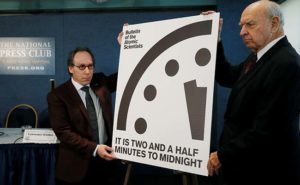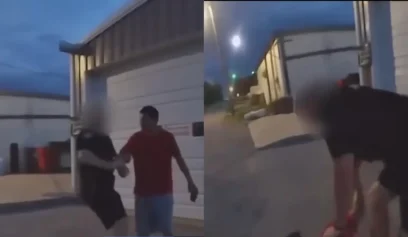
Bulletin of the Atomic Scientists members holding updated doomsday clock. Photo by Win Mcnamee/Getty Images
The nuclear “Doomsday Clock” moved 30 seconds closer to midnight on Thursday, Jan. 26, signaling concerns among scientists over the threat of nuclear warfare, climate change and other emerging technologies.
The symbolic clock, set by the Bulletin of the Atomic Scientists each year, illustrates whether the events of the previous year pushed humankind closer or further from complete and utter destruction through the use of “dangerous technologies of our own making.” But things aren’t looking good, as scientists moved the clock up just two minutes, 30 seconds from midnight, the closest it has been since the hydrogen bomb was initially tested in 1953.
“This year’s clock deliberations felt more urgent than usual, as trusted sources of information came under attack, fake news was on the rise — and words were used by a President-elect of the United States in cavalier and often reckless ways to address the twin threats of nuclear weapons and climate change,” said Rachel Bronson, executive director and publisher of the Bulletin of the Atomic Scientists.
While the Bulletin cited a number of reasons for its decision to tick the the clock 30 seconds from where it was last year, it was one person in particular who prompted scientists to move humanity that much closer to doomsday: President Donald Trump. Scientists asserted it was Trump’s inflammatory rhetoric on nuclear warfare, his questionable stance on global warming and a host of other pressing issues that sparked the time change. Now that the ex-reality TV star serves as the leader of the free world, scientists contend that what comes flying out his mouth (and Twitter fingers) matter more than ever.
“Mr. Trump’s statements and actions have been unsettling,” Lawrence M. Krauss and David Titley of the Bulletin wrote in an opinion piece for The New York Times. “He has made ill-considered comments about expanding and even deploying the American nuclear arsenal. He has expressed disbelief in the scientific consensus of global warming. He’s shown a troubling propensity to discount or reject expert advice related to international security.”
“And his nominees to head the Energy Department, the Environmental Protection Agency and the Office of Management and the Budget have disputed or questioned climate change,” they added.
Reuters reported that Thursday’s move from three minutes to two minutes and 30 seconds to midnight was the clock’s first reset since 2015, when it sat at five minutes to doomsday. Other factors that contributed to the time change included uncertainty over the future of the Iran nuclear deal, North Korea’s steady nuclear weapons development program, and the crumbling relationship between the U.S. and Russia, Krauss and Titley said.
The Bulletin was founded in 1945 by a group of scientists and nuclear and climate experts, who have been tasked with moving the hands on the clock since its editor, Eugene Rabinowitch, died in 1973, according to The New York Times. The group meets biannually to discuss how far the clock’s hands should be moved based on world events.


